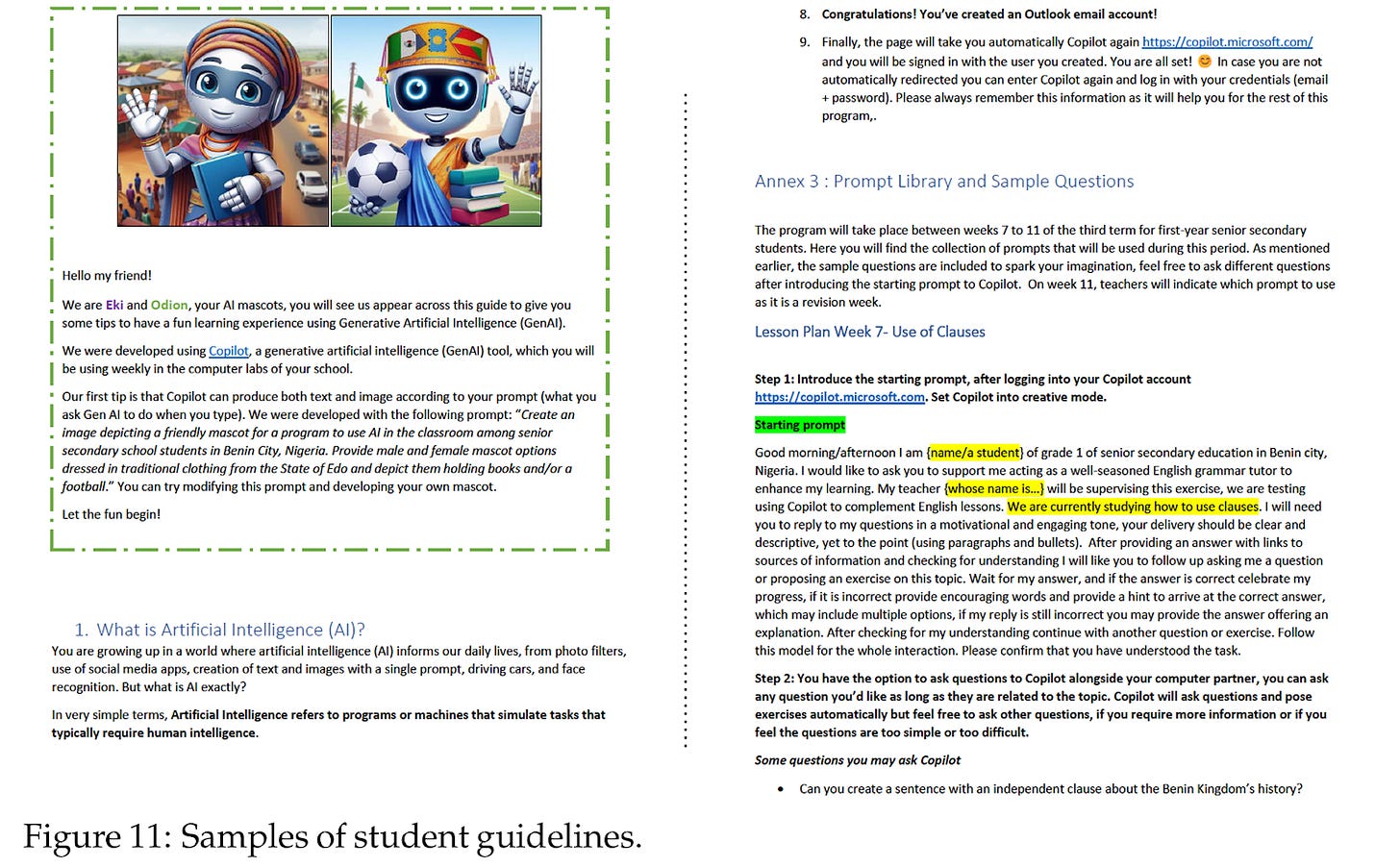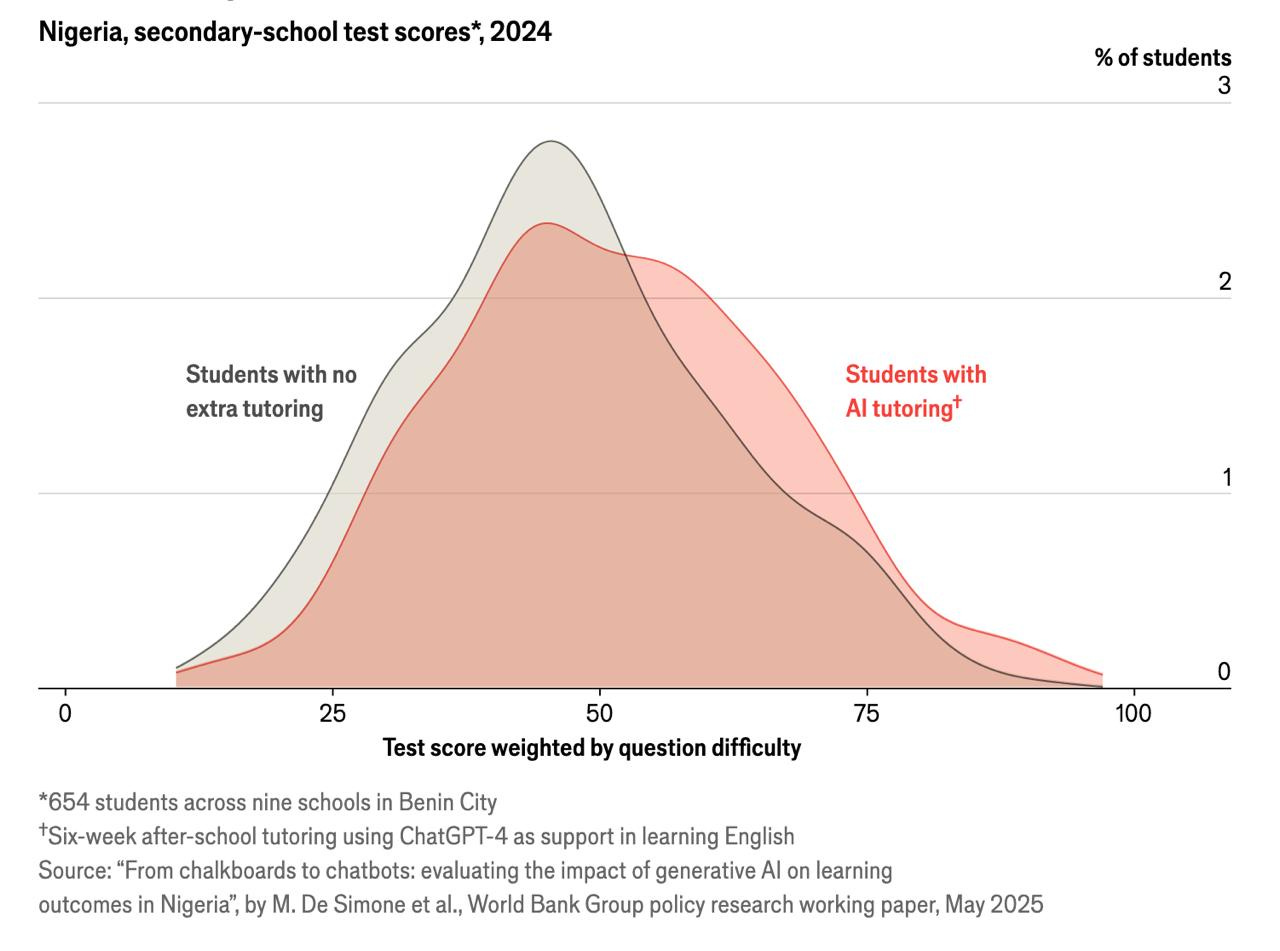When AI Tutors Beat Human Teachers: The Nigerian Experiment That Changes Everything
A World Bank study in Nigeria just delivered results that sound like science fiction. 422 schoolchildren worked with Microsoft Copilot (powered by GPT-4) for 90 minutes a day over 6 weeks. The outcome? Progress equivalent to two full years of regular schooling.
But here's where it gets really interesting: this miracle happened in one of the world's poorest educational systems, while wealthy countries are seeing the opposite results.
The Paradox Nobody Saw Coming
In Turkey and the Netherlands, carefully controlled AI experiments ended in failure. Students became so dependent on LLMs that without them, they performed worse than their peers. The very countries with the best schools, the most resources, the highest teacher salaries - AI made their students worse learners.
Meanwhile, in Nigerian computer labs where many students had never touched a computer before, AI was producing learning gains that education researchers only dream about.
This flips everything we think we know about technology and inequality on its head.
The Brutal Numbers Behind the Success
To understand why the Nigerian results matter so much, you need to see the educational disaster these kids are living through:
70% of ten-year-olds in developing countries can't read simple text
In Africa, that number hits 90%
Nigerian kids get 10 years of schooling but learn what should take 5 years
This isn't about "falling behind" - this is educational system collapse. Traditional interventions barely move the needle. The World Bank has tried everything: better textbooks, teacher training, smaller class sizes, nutrition programs. Most show modest improvements at best.
Then along comes an AI chatbot and suddenly students are learning at 4x normal speed.
The $48 Miracle
The program cost $48 per student for 6 weeks. In Nigeria, where minimum wage is around $43 per month, that's serious money. But when researchers compared it against 230 other educational interventions, this AI program outperformed 80% of them.
Think about what $48 bought these students: a personal tutor available 90 minutes every day, infinitely patient, able to explain concepts a thousand different ways until each student got it. Benjamin Bloom proved in 1984 that one-on-one tutoring could achieve exactly these kinds of gains. The problem was always cost - until now.
What Actually Happened in Those Computer Labs
Teachers became conductors, not replacements. They started each session with suggested prompts, guided student interactions, and led reflection exercises. As one teacher put it: AI is "like an assistant teacher. We supervise what the students are doing."
Students found their own ways to use it. Teachers noted that kids quickly discovered "unique and productive ways to interact with the LLMs." They weren't passive consumers - they became active learners figuring out how to get what they needed from the AI.
Infrastructure nearly killed it. Power outages and internet failures constantly disrupted sessions. Nigeria's rainy season was particularly brutal. Success required backup generators and redundant internet connections.
Prompt engineering was everything. The program developed specific toolkits showing students how to ask better questions. This made the AI responses "much more useful" with examples relevant to local context.
The Questions That Should Terrify Us
The results are incredible, but the study has gaps that matter:
They couldn't isolate the AI effect. Researchers admit they couldn't separate gains from AI versus gains from extra attention, computer access, or additional tutoring some students might have received.
Six weeks proves nothing long-term. Will these students retain their advantage in six months? Two years? Or will the gains fade like a sugar rush?
English only. The study focused purely on English language skills. Math? Science? Critical thinking? We have no idea if AI tutoring transfers to other subjects.
What about dependency? The wealthy country's results suggest AI can create learned helplessness. Are Nigerian students building genuine skills or just getting really good at prompting AI?
Why This Changes Everything (Maybe)
The same AI that creates dependency in Dutch classrooms unlocks potential in Nigerian ones. Why?
Scarcity changes behavior. When you've never had access to quality instruction, AI feels like a miracle. When you're used to excellent teachers, AI feels like a downgrade.
Baseline matters. If your education system is broken, AI can only improve things. If your system already works well, AI might disrupt what's working.
Expectations shape outcomes. Nigerian students saw AI as an opportunity to learn. Dutch students saw it as a way to avoid learning.
The Student Who Gets It
Maybe the most insightful comment came from a student at Edo Boys High School: "AI helps us to learn, it can serve as a tutor, it can be anything you want it to be, depending on the prompt you write."
Depending on the prompt you write.
That seventeen-year-old just articulated something most adults miss: AI is a mirror. It reflects back the quality of thinking you bring to it. Bring curiosity and effort, learn. Bring laziness and shortcuts, get dependency.
What Happens Next?
Scaling the Nigerian experiment faces massive challenges:
Infrastructure is expensive. Every classroom needs reliable power and internet. That's billions in investment across developing countries.
Teacher training is complex. Moving from chalk-and-talk to AI orchestration requires completely different skills.
Cultural resistance is real. Many communities see computers and AI as threats to traditional learning.
Measurement is hard. How do you separate AI impact from novelty effect, Hawthorne effect, and selection bias?
But even if half the Nigerian gains are real and sustainable, we're looking at the potential to solve the global learning crisis within a decade. Imagine: every child on Earth with access to world-class personalized tutoring for less than $50.
The Uncomfortable Truth
The most unsettling part of this story isn't the technology - it's what it reveals about global inequality.
Rich countries have such good educational systems that AI makes them worse. Poor countries have such bad educational systems that AI makes them dramatically better. The same tool simultaneously increases and decreases human potential, depending on context.
We're about to find out whether AI will be the great equalizer or the great divider.



